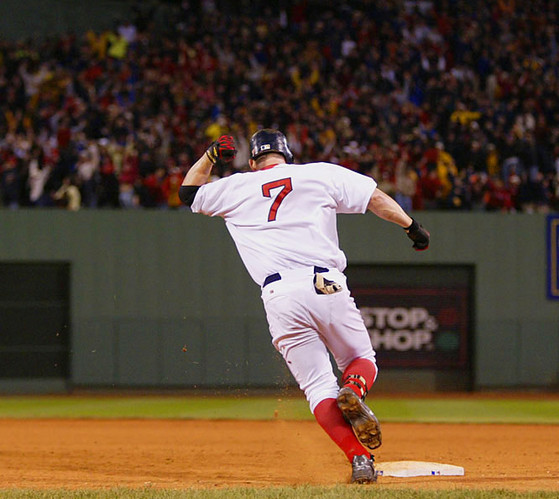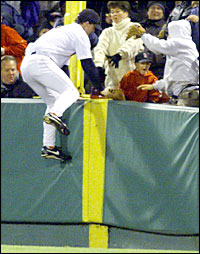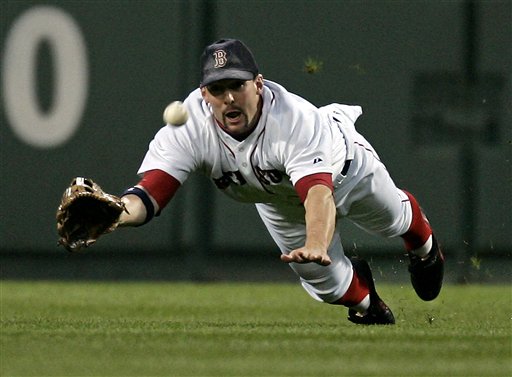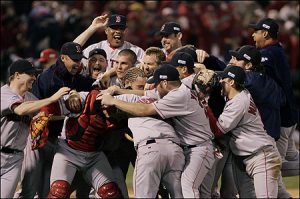 Former Red Sox right fielder Trot Nixon was the ultimate “dirt-dog,” a player who gave his all to make the play on the field. If you wanted to see Trot Nixon in a clean uniform you had to be there when the gates opened for batting practice.
Former Red Sox right fielder Trot Nixon was the ultimate “dirt-dog,” a player who gave his all to make the play on the field. If you wanted to see Trot Nixon in a clean uniform you had to be there when the gates opened for batting practice.
Trot Nixon played in more than 1,000 regular and postseason games for the Red Sox during a career that spanned ten seasons, playing hard in all of them. He ranks among the top 20 hitters in Red Sox history in career home runs and slugging average.
Trot was a first round draft choice for the Red Sox in 1993, and he was the longest-tenured member of the 2004 World Champions. Looking back on the team’s World Series win Nixon says, “Winning that World Championship was my biggest thrill in baseball. To be able to stand as 25 brothers and an entire nation—Red Sox Nation—made it very special.”
Red Sox Nation loved Trot Nixon and he feels the same way. “My family loved our time in Boston,” he emphasizes. “It is by far the greatest destination for any athlete, especially a baseball player. My family and I wouldn’t have had it any other way.”
WILMINGTON, NC, NATIVE
Christopher Trotman Nixon was born in Durham, NC, on April 11, 1974, and grew up in Wilmington, NC. Reflecting on his younger years, Trot says, “My father was my mentor on the ball field and in life. And my mother was always there for me. I was very fortunate to have such loving and committed parents.”
Trot’s dad, William Nixon, grew up in Hertford, NC, and played ball as a young man with future Hall of Fame pitcher, Jim “Catfish” Hunter. Trot remembers meeting Hunter, and says, “I remember being in awe of Catfish because he was a World Champion big leaguer that I got to be around.”
Trot Nixon excelled on the gridiron and the baseball diamond at NewHanoverHigh School in Wilmington. As a senior he was named state player of the year in both sports. He led the baseball team to the 4-A State Championship, and at quarterback he broke passing records set by NFL greats Sonny Jurgensen and Roman Gabriel. But baseball was always his first love.
“I loved football for all the life lessons you can derive,” Trot says. “But I had a dream to play professional baseball. And I wanted to reach the highest level, to play in the major leagues.” The Red Sox made him the 7th pick of the 1993 first-year player draft, and Trot Nixon walked away from a football scholarship at North CarolinaState to follow his dream.
MINOR LEAGUE DUES
Trot Nixon spent five seasons in the Red Sox minor league system preparing for the majors. His early development was slowed by a back injury, but after a solid year with Trenton at AA in 1996, he got his first taste of the big leagues that September. His first big league start was in the last game of the season, a game against the Yankees at FenwayPark.
“I was so nervous I dropped my bat in the batters box. And my first base hit,” he says referring to his line drive to short right field in the second inning, “was just a blur. But most of all I remember that Mike Greenwell sat out so I could play. I have a lot of respect for Greenie for that.”
Trot Nixon spent the next two seasons with the PawSox. He acknowledges there were periods of frustration in the minors. “I was disappointed that I wasn’t living up to my expectations. But I learned a lot about myself and what I needed to do to attain my dream. And I had great teammates and coaches who helped push me through the frustrations.”
In 1998 with Pawtucket he hit .310 with 23 home runs and he was named the Red Sox Minor League Player of the Year by the Boston Baseball Writers. His outstanding season earned him a call-up to the Red Sox in September, and his solid play earned him a roster spot for the ALDS against the Cleveland Indians.
BIG LEAGUE DREAM
 Trot Nixon’s dream of playing in the major leagues came true when manager Jimy Williams named him as the Red Sox regular right fielder to begin the 1999 season. But his season got off to a nightmarish start. At the end of April he was batting only .105.
Trot Nixon’s dream of playing in the major leagues came true when manager Jimy Williams named him as the Red Sox regular right fielder to begin the 1999 season. But his season got off to a nightmarish start. At the end of April he was batting only .105.
Nixon remembers how difficult it was to get traction that first full season. “I lost my rhythm and my confidence real quick. But Jimy Williams [Trot Nixon’s first Red Sox manager] never gave up on me and he threw me extra batting practice almost every day. And Jim Rice [Red Sox hitting coach at the time] worked hard with me during regular batting practice.”
His batting average rose along with the Boston May temperatures and on June 1, he was batting .250. On July 24 he launched three home runs in Tigers’ stadium, triggering memories of Fred Lynn’s three home runs as a rookie in the same venue.
Nixon erased any doubts he belonged by batting .298 with 12 home runs after the All-Star beak. His solid batting and relentless defensive play earned him the right fielders job for the foreseeable future.
DIRT DAWG SUPREME
In the 2000 season, Nixon continued his steady play, and he improved in most offensive categories. A season highlight was a two-run ninth inning home run in Yankee Stadium off Roger Clemens, in a 2-0 Pedro Martinez masterpiece. Trot agrees that key home run gave him a confidence boost.
In 2001, Trot lifted his offensive production to a level that established him as a premier major league player. “I had better numbers in 2003,” he says, “but in 2001, I really felt I belonged. I batted leadoff a lot that season, and I loved being the guy to get our offense going.”
 Along the way his everyday intensity earned him the title of “Dirt Dawg.” Trot points out that he didn’t come up with the nickname. “It was a Toronto pitcher, Paul Quantrill, who referred to me and some of my teammates that way, saying we never went away.
Along the way his everyday intensity earned him the title of “Dirt Dawg.” Trot points out that he didn’t come up with the nickname. “It was a Toronto pitcher, Paul Quantrill, who referred to me and some of my teammates that way, saying we never went away.
“At first I thought it was an insult, but I talked to Dauber [first baseman Brian Daubach] and others, and we agreed it was a wonderful compliment. It stuck from there.”
In 2002, Nixon achieved personal highs in doubles, RBIs and games played, and he hit safely in a career-best 16 straight games. But the Red Sox finished second in the AL East, and failed to qualify for the postseason for the third straight year. “I was never about personal statistics,” Trot emphasizes. “I signed with the Red Sox because I wanted to help bring a World Championship to Boston.”
POSTSEASON HIGHS AND LOWS
A high-powered offense that produced almost six runs per game, led the 2003 Boston Red Sox to 95 victories and a playoff spot as the American League Wild Card winner. Trot Nixon enjoyed perhaps his finest offensive year, and points out, “When you are surrounded by hitters like the lineup we had that year, it makes everyone a better hitter.”
In the 2003 ALDS the Red Sox lost the first two games in Oakland to the A’s. When Trot Nixon pinch-hit in the last of the 11th inning of Game Three at FenwayPark, the score was tied 1-1, and the team was on the brink of elimination. Nixon rocketed a Rich Harden fastball into the centerfield bleachers for a 3-1 victory, the first Red Sox postseason walk-off home run since Pudge Fisk’s historic Game Six home run in the 1975 World Series.
Trot Nixon ranks that home run among his baseball highlights. “The best part was I was blessed to have done it home in front of our fans.” The Red Sox went on to beat the A’s in Games Four and Five, moving on to face the Yankees in the ALCS. Echoes of “Cowboy Up” could be heard throughout Red Sox Nation.
Less than two weeks later, Aaron Boone homered in the bottom of the eleventh inning at Yankee Stadium in Game Seven of the ALDS, ending the Red Sox hopes for a World Championship. Nixon agrees that the two series captured the highs and lows of professional baseball. “Baseball is a tremendous game that can humble you in seconds. That’s what makes it so unique.”
Reflecting on the heartbreaking ALCS loss to the Yankees, Trot says, “That took awhile to get over. But when the front office went out and signed Schilling and Foulkie [closer Keith Foulke] we knew we would be in the thick of things in 2004.”
WORLD CHAMPION BOSTON RED SOX
Trot Nixon began the 2004 season on the disabled list and didn’t play until June 16, celebrating his return with a home run in Colorado against the Rockies. Asked if there was a point in the season where he was convinced the team would qualify for the postseason, he says, “When Billy Ballgame [third baseman Bill Mueller] hit his bomb off Mariano Rivera,” referring to the Red Sox come-from-behind, 10-8 win against the Yankees on July 24. “That sold me on the 2004 team.”
The Red Sox swept the Angels in the 2004 ALDS, but after dropping three straight to the Yankees, their backs were against the wall as they prepared for Game Four of the ALCS. Asked about the mood of the Red Sox clubhouse before that game, Trot says, “We were still confident but we knew what we were up against.
“Tek spoke up as our captain and said, ‘We just have to take it one half-inning at a time. Let’s win the top half of the first and hold them scoreless. Then let’s win the bottom half, maybe go up by a run.’ Putting it that way, made it manageable and we didn’t have to think about winning four games.”
After one of the great sports comebacks ever, defeating the Yankees in four straight games, the Red Sox faced the St. Louis Cardinals in the World Series. Nixon, who batted .357 during the Red Sox sweep of St. Louis, says emphatically, “There was no way the Cardinals were going to beat us. There was no way anyone could have beaten us. We were unstoppable after we beat the Yankees.”
 Asked for his lasting memory from the 2004 World Championship celebration, he says, “I thought about how the reporters had laughed and smirked at the press conference when I signed with the Red Sox and I said I wanted to help bring a championship to Boston. We were able to quiet that laughter with our World Series win.”
Asked for his lasting memory from the 2004 World Championship celebration, he says, “I thought about how the reporters had laughed and smirked at the press conference when I signed with the Red Sox and I said I wanted to help bring a championship to Boston. We were able to quiet that laughter with our World Series win.”
LATER YEARS
Trot Nixon played with the Red Sox for two more seasons, and he led American League right fielders in fielding percentage in 2005. Sensing that the final game of the 2006 season might be his last time in a Red Sox uniform the Fenway faithful gave him a series of ovations during the October 1 game against the Baltimore Orioles.
After signing with the Cleveland Indians as a free agent in 2007, Trot Nixon had the unusual experience of playing at Fenway in a visitor’s uniform. “It was a little strange,” he says, “but I got to visit with the visitor’s clubhouse guys, and it was great to see them. And I got to see the parking lot guys, and the concessionaires I knew. A player misses a lot if he doesn’t get to know all the people connected with the organization.”
Looking back he says, “I will never forget my first at-bat as a visitor and the fans’ response.” Speaking of his total Boston experience he adds, “I could probably never put into words how much it meant to me, what the fans and organization did for me and my family.”
TROT NIXON TODAY
Christopher Trotman Nixon was born in Durham, NC, on April 11, 1974, and grew up in Wilmington, NC. Reflecting on his younger years, Trot says, “My father was my mentor on the ball field and in life. And my mother was always there for me. I was very fortunate to have such loving and committed parents.”
Asked if he has any message for Red Sox fans, Trot says, “I was deeply blessed and honored to play baseball at the highest level in the greatest venue in sports. I was spoiled by Red Sox Nation because of their unwavering passion for the game. And tell Red Sox fans the Dirt Dawg is still lingering around the corner trying to help the next kid with his big league dreams.”
The 2018 Boston Red Sox have a goodly share of dirt-dogs. But Trot Nixon is the original, and one and only “Dirt Dawg.”


This is a fine,well written article. I learned a lot about Trot Nixon. He seems like a very good man.
D. O. D,
Oh my childhood hero. I will never forget that bomb off Mariano. He and teddy ballgame are my next tattoos